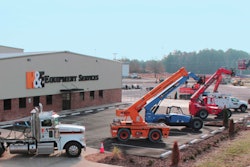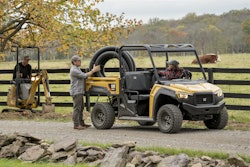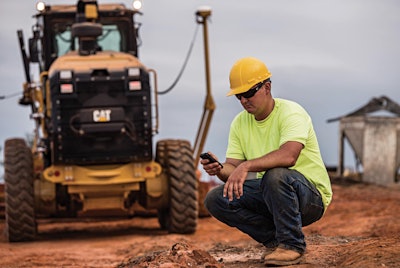 Peer-to-peer equipment rental services like Dozr, EquipmentShare and AnyQuip have opened up a previously untapped revenue stream for contractors, allowing them to easily rent out their idle machines to other contractors with just a few taps of their phone or tablet. But rather than present a threat to heavy equipment dealers and rental houses, these upstart services are looking to augment those traditional businesses. Photo: Caterpillar
Peer-to-peer equipment rental services like Dozr, EquipmentShare and AnyQuip have opened up a previously untapped revenue stream for contractors, allowing them to easily rent out their idle machines to other contractors with just a few taps of their phone or tablet. But rather than present a threat to heavy equipment dealers and rental houses, these upstart services are looking to augment those traditional businesses. Photo: Caterpillar
During a 2015 talk on innovation and how he and his team were working to transform 90-year-old heavy equipment manufacturer Caterpillar into a company whose machines move as much data as they do dirt, then CEO Doug Oberhelman had a unique way of describing his motivation.
“We decided that maybe we better disrupt ourselves—in our own way—before somebody does an Uber to us,” he said, referring to the popular ride-sharing service.
Oberhelman’s reference to the controversial and widely-used ride-sharing service may not have been a random one. Uber’s meteoric rise along with that of Airbnb gave life in the U.S. to what is now known as the sharing economy. Uber and competitor Lyft have become serious threats to taxi businesses in just about every major city in the country. Meanwhile, Airbnb allows travelers to find a place to stay faster and, in many cases, more affordably, than traditional hotels and travel websites.
It wasn’t long after Uber and Airbnb became household names that startups like Getable began claiming to be the “Uber for construction equipment,” allowing contractors to list and rent out their idle equipment to other contractors. But do these equipment sharing services pose a real threat to traditional rental houses and equipment dealers? Right now, the short answer is no.
That’s largely because equipment distributors have avoided “an Uber,” to borrow Oberhelman’s phrase, by responding proactively to these startup services. Rather than watch these services begin to eat away at their market share, equipment dealers and rental houses have quickly partnered up with the majority of online equipment services as a way to reach customers in a faster, more direct manner.
Rather than a threat, online equipment sharing and rental services represent an evolution of the traditional distribution model. In fact, there’s a lot for dealers and rental houses to like about an industry with these new digital players. Here’s why.
Not so crowded anymore
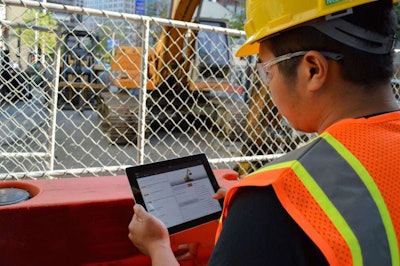 A contractor browsing Getable. Photo: Getable
A contractor browsing Getable. Photo: GetableTypically, equipment sharing services allow contractors to quickly browse an app or website for the machine they need and rent it for less than they would pay a traditional rental house or dealer. In many instances, renting contractors don’t even have to leave their own yard as some services oversee delivery of the machines in addition to coordinating the transaction between the two parties.
Considering that these services are a win-win for the renter and rentee alike, the market for heavy equipment sharing services quickly became crowded with the likes of Yard Club, EquipmentShare and Dozr to name just a few. And as more players entered the field and began working to offer services in more parts of the country, it’s easy to imagine equipment distributors and manufacturers with dealer networks nervously watching out of the corner of one eye.
But after talking with people inside these companies it’s safe to say that any concerns that online equipment sharing and rental services will “disrupt” the traditional U.S. distribution model for heavy equipment here in the U.S. are overblown.
For starters, the field of players is quickly becoming less crowded.
Getable, the “Uber for construction equipment” we mentioned earlier and at one time a major player, seems to have vanished completely. Their apps have disappeared from the iOS and Android app stores and their website returns a “can’t be reached error.” Oddly enough, there’s no formal announcement or even a news article about the service shutting down to be found on the web. The company’s CEO Tim Hyer was giving interviews as recently as the spring of 2016, but since then the company has seemingly disappeared. And it’s not like no one noticed. When you run a Google search for “Getable” one of the related searches Google suggests is “what happened to Getable”.
But there’s more than one way for a company to vanish.
Launched in 2013, San Francisco-based startup Yard Club grew quickly, eventually catching the attention of Caterpillar. By 2015 Caterpillar had not only invested in Yard Club, the equipment giant also greatly expanded the startup with a massive infusion of available inventory by way of integrating the Cat dealer network.
In 2016 Yard Club facilitated more than $120 million in equipment transactions in North America. In May of this year, Cat announced that it had acquired the 13-person company for an undisclosed sum.
Not only did Cat decline to disclose terms, the heavy equipment giant didn’t really acknowledge the purchase at all. No press release. No replies to our requests for comment. Radio silence.
Eventually we were able to have a conversation with Aaron Kline, the former chief operating officer of Yard Club and now a member of the Cat Digital Lab team. As it turns out, Cat bought the company primarily for the technology that not only facilitated the contractor-to-contractor transactions but also an impressive fleet utilization dashboard that gave customers the ability to manage the coming and going of machines.
In fact, though the company continues to facilitate rentals in seven states, it’s unclear as of right now if that will continue in the future. Kline said that Yard Club’s technology was being ported over to Cat’s rental applications. Since the Cat takeover, Kline said Yard Club has primarily become “the San Francisco office for Caterpillar,” and added that Cat had been eyeing establishing a presence closer to Silicon Valley “for a while.” It’s possible that by next year, Yard Club will be entirely absorbed by Cat and will be out of the equipment sharing business entirely.
If that plays out, Cat will have avoided “an Uber” by buying it.
But more than simply avoiding a disruptive platform, the company is making its own distribution channels even stronger with Yard Club’s technology and direct contact with contractors.
A race to the bottom?
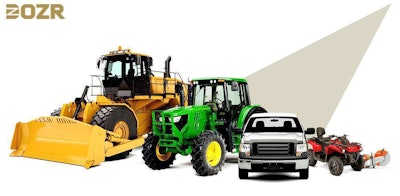
But what if your machine sharing service doesn’t vanish or isn’t acquired by the world’s largest construction equipment manufacturer? Then your biggest problem is scalability.
A source inside one of these equipment sharing companies who declined to be named for this story said it’s become clear that the market potential for peer-to-peer (P2P) equipment rental is low, noting that standalone P2P services are hard to scale. Compounding problems is that some of these companies were started as technology companies and now find themselves transforming into low-price rental companies caught in a race to the bottom.
And while lower prices are certainly attractive to all contractors, it’s far from the only motivating factor when it comes to who they decide to buy and rent equipment from. Contractors also want to be assured of a rental machine’s uptime and renting from an established rental house or their dealer of choice offers substantial peace of mind in that regard, albeit at a higher cost.
And while there is worry in the industry that P2P rentals are swept up in a race to the bottom, Kevin Forestell sees things much differently.
Forestell is the owner of a landscaping company and the CEO and co-founder of Dozr, a Canadian P2P equipment rental company that has quickly amassed investments and expanded into the U.S. down the East Coast. He started the company with his wife Erin Stephenson and his brother Tim in 2015 to make it easier for his fellow contractors to maximize their return on investment of otherwise idle equipment.
Forestell says he feels P2P equipment rental services like his are primed to transform the industry.
“I really feel that Dozr and the sharing economy with regards to construction equipment is going to change the way we view ownership as contractors,” he says. “We’re already seeing contractors who are purchasing equipment for renting it out rather than using it in their traditional business.
“They’re making more money for buying and renting than putting operators in those seats.”
Fewer idle machines could mean more purchases
Forestell says that rather than the growth of equipment sharing services encouraging more contractors to rent and thereby hampering heavy equipment sales, he sees these services actually leading to increased machine purchases and more confident bidding for jobs.
“Dozr takes away some of the risk of purchasing,” he says, explaining that the service allows contractors to buy a machine without worrying about whether not it will be utilized enough to recoup the investment. “Say there’s a guy with a two-year job coming up and they need a specific piece of heavy equipment for this job but he has nothing lined up afterward. Do they go ahead and purchase that machine? Maybe, maybe not. Do they bid on the job? With Dozr, we believe they do now.”
But Forestell thinks Dozr’s impact could reach far beyond convincing a contractor to pull the trigger on a machine purchase. He says that if equipment sharing becomes commonplace, the average number of machine utilization hours will go up, leading to faster turnover and machines exchanging hands more often.
When I asked Forestell about his company’s stance toward dealers and rental houses, I was a bit surprised at his response, given that he was just talking about changing the way contractors view the concept of equipment ownership. Turns out, Dozr is open to working closely with any equipment dealer that wants to work with them. In fact, Forestell says Dozr can be a big help to a dealership’s business.
“We’ve had quite a few interactions with dealers, the most common one being them using our service in the same way a hotel uses Expedia,” Forestell explains. “Many dealerships have a rental fleet for the purpose of buying down their slightly used equipment. Maybe they take a machine in at too high of a trade-in value, so they make that equipment available for rent on Dozr and they’ll buy down that value so they can sell it at a more reasonable price to their customers. That’s a pretty consistent thing we’re seeing across Canada and the U.S.”
Connection and uptime are key

Like Dozr, AnyQuip is an online equipment rental service headquartered in Canada and started in 2015 by a contractor. CEO Steve Skiba owns a civil contracting business and started the company in order to shore up downtime during his off-season. And like Dozr, AnyQuip sees a big opportunity in partnering with equipment dealers and rental houses.
“It’s not about pushing anybody out of the business for us,” Skiba says. “It’s about connecting.”
Skiba says the main focus at AnyQuip is the contractor. The company’s goal is to make equipment rental a more efficient and simple process for business owners. The best way to do that is to offer them as many machines as possible to choose from and from as many sources as possible.
AnyQuip chief marketing officer Jen Lussier called it “creating a liquidity in the equipment.”
“In the contractor world, you’re really not set up to [rent out your own machines]. So we’re trying to connect contractors to make it simple,” to both rent and rent out equipment, Skiba says.
But while Forestell thinks online equipment services like Dozr and AnyQuip will end up being a boon to the sales side of things, Skiba thinks that the end result will be more contractors renting equipment than before.
“I don’t think you’ll see any more equipment bought or sold because this industry will just redistribute it,” he explains. “But I don’t think [contractors] can afford to sit on equipment for six months anymore. Better, faster, quicker, cheaper. It has to go that way and equipment is the biggest capital expense you’re going to spend in your business.”
“There’s going to be guys in the future who won’t ever own any equipment.”
While Skiba says the rental houses have nothing to worry about in the form of digital disruption (“There’s always going to be things contractors don’t want to own.”), he does contend that dealers and manufacturers will likely have to answer to the trend of online rentals. In Skiba’s mind, the future might mean more dealers selling uptime through rentals rather than the machines themselves.
“The difference is how is a dealer in the future going to be connected to a customer? The dealers and manufacturers have to figure out how do I connect to my contractor more and get him more uptime?” he says.
The Google of heavy equipment
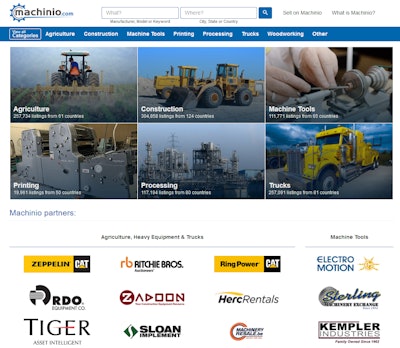 Machinio wants to be the Google of construction equipment. The service works closely with dealers, featuring several of them on its homepage.
Machinio wants to be the Google of construction equipment. The service works closely with dealers, featuring several of them on its homepage.At a basic level, services like EquipmentShare, Dozr and AnyQuip all share a common functionality: they’re all search engines. But unlike Google, most of these services don’t return results from all over the world, let alone the U.S. The nature of peer-to-peer equipment rentals typically requires that the two parties be close enough geographically to facilitate a transfer of the machine. Granted, some of these services actually do let you rent from a fellow contractor thousands of miles away. Forestell says Dozr has even facilitated a few transactions between contractors in Canada and Florida.
But that type of facilitation requires a lot of work and a slow-growing footprint. Dozr is making its way out of Canada and down the U.S. East coast as quickly as it can. AnyQuip, meanwhile, is content to stay in its home market of Calgary for the time being. And before it was acquired by Cat, Yard Club had managed to expand service to seven states out West.
Despite their quick growth, these services remain highly regional. And there’s at least one online equipment service that has loftier ambitions in that regard.
Machinio is a Chicago-based startup established nearly five years ago by co-founders Dmitriy Rokhfeld and Dan Pinto. Unlike the other services we interviewed for this story, Machinio doesn’t deal in equipment rentals. Instead, Machinio helps buyers find used heavy equipment to purchase from sellers around the world.
Rokhfeld says that he and Pinto started the company after stumbling upon a rather simple pain point for contractors.
Rokhfeld says Pinto was asked by a friend to find a used machine for sale online. “He had the model, the manufacturer and a few specs and he struggled to find one,” Rokhfeld says. To clarify: it wasn’t that there weren’t enough machines for sale. It was that Google was returning way too many to sort through.
“There were just millions and millions results,” Rokhfeld recalls. “Some were relevant. Some were pricing details. Some were YouTube videos and then there were hundreds of results of dealers selling that machine.”
Rokhfeld and Pinto realized that heavy equipment buyers would greatly benefit from a vertical search engine akin to those in other industries like Indeed for jobs, or Kayak, Travelocity and a host of others for travel.
“We love that model and were shocked to find that the used heavy equipment industry did not have a platform that does what Google does but hyper targeted on used equipment,” Rokhfeld says.
Rokhfeld says Machinio is now capable of aggregating millions of listings from thousands of different sources. The platform has gained quite a bit of attention from investors, including Ritchie Bros. Auctioneers, a minority investor in Machinio and a giant in the used equipment industry.
And like their counterparts Dozr and AnyQuip on the P2P rental side, Machinio is partnering with any and all dealers.
In fact, though Machinio’s end users are prospective equipment buyers, the company’s primary clients are equipment dealers.
“We work with tens of thousands of used machinery dealers and the major auction platforms,” Rokhfeld says. “Our most basic value proposition is more exposure to buyers. A buyer comes to our site and they fill out their full contact information and we send that via email to a dealer. We’re not trying to be an intermediary, we’re trying to connect the two parties and step aside.”
“Long term, we want Machinio to be a true partner to dealers. All of our leads are vetted and only quality leads are passed along. We remove up to 20 percent of the leads on our system and we track that metric monthly. Last month we generated over 50,000 leads.”
But Rokhfeld says the Machinio platform has a wealth of data beyond leads to offer dealers that can be a valuable asset in managing inventory and marketing spend.
“With the clients that purchase a premium subscription we offer additional benefits like higher listing placement and monthly analytics reports that draws from all the data coming into our platform which includes insights like which of your equipment is most popular, how buyers are searching for it and in what locations,” he says.
“We’re even willing to help with their search ranking on Google. But we would never tell them how to sell their equipment. That’s not our skill set.”
Rokhfeld says Machinio has more than 1,500 dealers signed up to its premium analytics and marketing service. Like the other online services, he says the main focus is connection.
“We’re not changing the sales process. We’re just making it easier for buyers and sellers online to get in touch with one another,” Rokhfeld says.

